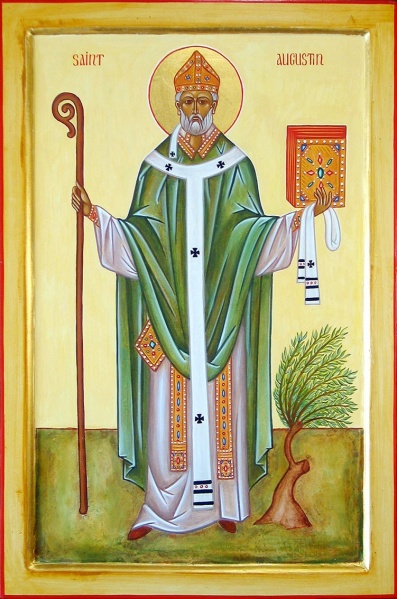Born in a Roman family of moderate standing, St. Augustine's parents highly valued education for their son. They did everything within their means to make sure that he went to the best schools and was able to receive the training he needed to be a highly successful rhetorician when he graduated. Though St. Augustine wasn't terribly interested in his education, he did what his parents required of him.
 |
| Image from Orthodoxwiki |
As a student and citizen of Rome, Augustine was also exposed to a variety of philosophies and religions. It was around the time of his late-teens and early-twenties when Augustine joined the ranks of the Gnostic sect, the Manicheans, turning away from the little bit of Christian upbringing that he had been given. He also dabbled in astrology for many years and later when he had abandoned Manicheaism, was interested in the philosophy of Neoplatonism.
In the meantime, his mother Monica had been drawn more strongly to the Christian faith and began to encourage her son to abandon his profligacy and worldliness to become a follower of Christ. Under the influence of St. Ambrose of Milan, Augustine began to learn about the teachings of Christ and the Christian way of life. For many years, Augustine struggled in his heart with Christianity, knowing especially that a true conversion would mean a huge change in lifestyle for him (by this time, he had been living with the same woman out of wedlock for 13 years and had fathered a son by her).
Eventually, Augustine was convicted by the life of St. Anthony the Great, and made his full confession of Christ, repenting of his past sins and committing himself to a life of purity, charity, and repentance. It was then, at the age of 32, that St. Augustine began to move away from destruction and towards Life. Today, the Church commemorates him as a blessed bishop who fought against heresy, wrote beautiful spiritual books such as his Confessions, and lived a life pleasing to God rather than one pleasing only to himself.
St. Augustine's moment of conversion in his own words:
I flung myself down under a fig tree—how I know not—and gave free course to my tears. The streams of my eyes gushed out an acceptable sacrifice to thee. And, not indeed in these words, but to this effect, I cried to thee: “And thou, O Lord, how long? How long, O Lord? Wilt thou be angry forever? Oh, remember not against us our former iniquities.” For I felt that I was still enthralled by them. I sent up these sorrowful cries: “How long, how long? Tomorrow and tomorrow? Why not now? Why not this very hour make an end to my uncleanness?”
I was saying these things and weeping in the most bitter contrition of my heart, when suddenly I heard the voice of a boy or a girl I know not which—coming from the neighboring house, chanting over and over again, “Pick it up, read it; pick it up, read it.” Immediately I ceased weeping and began most earnestly to think whether it was usual for children in some kind of game to sing such a song, but I could not remember ever having heard the like. So, damming the torrent of my tears, I got to my feet, for I could not but think that this was a divine command to open the Bible and read the first passage I should light upon. For I had heard how Anthony, accidentally coming into church while the gospel was being read, received the admonition as if what was read had been addressed to him: “Go and sell what you have and give it to the poor, and you shall have treasure in heaven; and come and follow me.” By such an oracle he was forthwith converted to thee.
This image is from the Wikimedia Commons
So I quickly returned to the bench where Alypius was sitting, for there I had put down the apostle’s book when I had left there. I snatched it up, opened it, and in silence read the paragraph on which my eyes first fell: “Not in rioting and drunkenness, not in chambering and wantonness, not in strife and envying, but put on the Lord Jesus Christ, and make no provision for the flesh to fulfill the lusts thereof.” I wanted to read no further, nor did I need to. For instantly, as the sentence ended, there was infused in my heart something like the light of full certainty and all the gloom of doubt vanished away.
Closing the book, then, and putting my finger or something else for a mark I began—now with a tranquil countenance—to tell it all to Alypius. And he in turn disclosed to me what had been going on in himself, of which I knew nothing. He asked to see what I had read. I showed him, and he looked on even further than I had read. I had not known what followed. But indeed it was this, “Him that is weak in the faith, receive.”
Source: St. Augustine's Confessions, http://www.ccel.org/ccel/augustine/confessions.toc.html

No comments:
Post a Comment